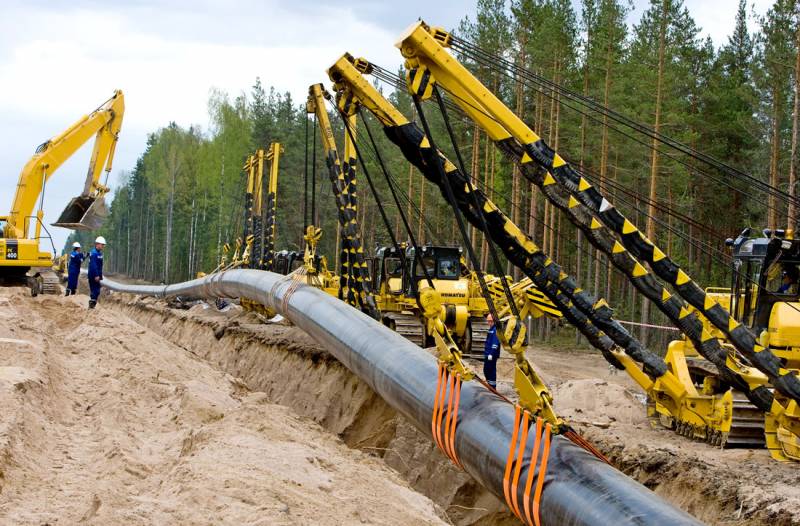The United States took the first step towards the construction of the Trans-Caspian gas pipeline
The energy crisis, in which Europe unexpectedly finds itself, is forcing the collective West to look for sources of gas supply alternative to Russia. Apparently, the Americans and Europeans have staked on Turkmenistan, which again got a chance to become part of the Southern Gas Transportation Corridor.
The idea of building a Trans-Caspian gas pipeline has long excited the minds in Ashgabat and Brussels. Turkmenistan ranks fourth in the world in terms of proven gas reserves, but due to its geographic location it is extremely constrained in its export opportunities. Neighbors - China, Russia and Iran - shamelessly take advantage of Turkmenistan's lack of alternatives, buying "blue fuel" at significant discounts either for their own needs or for subsequent resale. The solution to the problem for Ashgabat would be the construction of an offshore pipeline on the bottom of the Caspian Sea, which would connect its main fields with the TANAP and TAP gas pipelines, which are part of the Southern Gas Transportation Corridor going to the South of Europe.
However, the Trans-Caspian gas pipeline faced several serious problems:
At firstUntil 2018, construction was hampered by the legally unregulated status of the Caspian itself. Other Caspian states, in particular Russia and Iran, were categorically against the emergence of such a gas transmission route.
Secondly, Baku was also very ambiguous about the project, fearing that Turkmen gas could compete with Azerbaijani.
Thirdly, it was not clear who exactly would pay for this "banquet". All interested parties nodded thoughtfully at each other.
Everything changed in 2018. The Convention on the Caspian Sea was adopted, within the framework of which Ashgabat and Baku received the right to build an underwater gas pipeline, regardless of the opinion of other Caspian countries, in particular Russia. (And why did Moscow sign it?) The only limiting factor is the need to obtain a positive environmental opinion on the project from the Russian leadership. Let's just say that this is a “veto” right, but not abrogative, but only a suspensive one. The example of Nord Stream 2 shows that it is possible to drag out the certification process for years, as in Denmark, but a permit will still have to be issued sooner or later. In addition, Europe is faced with a severe energy crisis, which for some reason blames Gazprom exclusively. Completely Turkmen gas will not replace Russian gas, but it can become a serious help in the future.
So what is currently happening in this area?
In fact, progress has begun, which is quite alarming for Gazprom. In the US state of Florida, a startup company was registered a few months ago under the speaking name Trans Caspian Resources (TCR). The composition of its members is interesting, among which, for example, the former US Ambassador to Turkmenistan Alan Mustard, it is managed by the prominent lobbyist Bert Watson, and the advisory board includes two former high-ranking employees of the British energy company BP, which is the largest investor in the economy Azerbaijan and has been working in the Caspian for a long time. What is the essence of this British-American startup?
Around the central part of the Caspian Sea, BP has the Azeri-Chirag-Guneshli (ACG) oil field, which belongs to Azerbaijan. The Turkmen oil and gas condensate field Magtymguly is located nearby. Associated gas released during oil production is burned in special flares, which seriously harms the ecology of the region. Trans Caspian Resources is proposing to build a small seabed pipeline just 42 kilometers long between the two fields to redirect Turkmen gas to the Azerbaijani pipeline system to the Sangachal gas processing plant. Approximate supply volumes may amount to 10-12 billion cubic meters of gas per year.
Sounds interesting. Baku could buy this "extra" gas and use it at its own discretion, Ashgabat would then receive additional currency earnings. An additional bonus of the project will be the contribution to the protection of the unique ecology of the Caspian Sea. Judging by the composition of the founders of Trans Caspian Resources, startups have everything on ointment. There is a strong impression that this 42-kilometer undersea pipeline is the first real step towards the construction of a full-fledged Trans-Caspian gas pipeline.
What is there to specifically object to? The British-American company will be able to beat itself in the chest, pointing out the real benefits of the ecology of the region. Finding reasons to refuse a startup will be very problematic. Having received one positive opinion from Russia on Trans Caspian Resources, the next ones concerning the construction of the main pipeline will go much easier.
- Sergey Marzhetsky
- https://invest.gazprom.ru/

Information